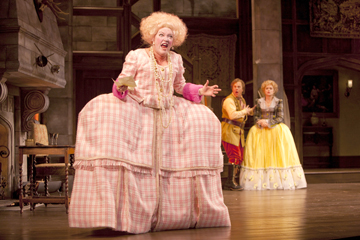
|
|
Vol. LXIII, No. 42
|
|
Wednesday, October 21, 2009
|
 PSHAW, PSHAW, THIS IS ALL BUT THE WHINING END OF A MODERN NOVEL: Thus ends the Oliver Goldsmith play “She Stoops to Conquer.” Shown here in a scene from the play are Kristine Nielsen (left center) as Mrs. Hardcastle with Brooks Ashmanskas (center background) as Tony Lumpkin, and Rebecca Brooksher (right background) as Constance Neville. |
Except for Moliere’s brilliant comedies (1660-1673), the 250-year period from the time of Shakespeare in the early 1600s to the time of Henrik Ibsen and George Bernard Shaw in the late 1800s is seldom represented on the contemporary stage. Oliver Goldsmith’s She Stoops to Conquer, first performed in 1773 at Covent Garden, is a notable exception. Goldsmith’s masterpiece of “laughing comedy” nonetheless has prevailed through the centuries and promises a lively evening’s entertainment in its current lavish production at McCarter’s Matthews Theatre.
What accounts for the continuing popularity of this play over the 235-year period since its creation? It’s funny — and the five main characters who both perpetrate and suffer the consequences of the deceptions and mistaken identities that drive the action are interesting and idiosyncratic, amusing and appealing in all the flaws and foibles of their rich humanity.
A superb cast, under the artful, expert direction of Nicholas Martin (current artistic director of the Williamstown Theatre Festival), embody these eccentric figures with extraordinary energy, panache, and humor, while David Korins’ grandly realistic set and Gabriel Berry’s delightfully creative costumes, combining a realistic 18th century look with some wildly colorful extravagances (described by the director as “modern fabric but in the silhouette of the period”), contribute richly to the characterizations and action of the play.
The thin, rather absurd plot focuses on Kate Hardcastle (Jessica Stone) and her proposed marriage to Charles Marlow (Jon Patrick Walker), the son of an old friend of Kate’s father, the country squire Mr. Hardcastle (Paxton Whitehead). At the outset, Marlow is on his way to visit the Hardcastles in order to meet Kate. Tony Lumpkin (Brooks Ashmanskas), the ne’er-do-well jokester son of Mrs. Hardcastle (Kristine Nielsen) and stepson of Mr. Hardcastle, encounters Marlow and his friend Hastings (Jeremy Webb) on the way and deceives the gentlemen by directing them to his parents’ old-fashioned country house and assuring them that it is an excellent inn.
Oliver Goldsmith’s “She Stoops to Conquer” will play at McCarter’s Matthews Theatre through November 1. Call (609) 258-2787 or visit www.mccarter.org for information.
Marlow, who has no difficulty carousing with ladies of the lower classes but finds himself completely tongue-tied among females of the aristocracy, mistakes Hardcastle’s house for an inn, Hardcastle for the innkeeper and Kate for a barmaid. Kate readily plays along in order to further her own ends with the bewildered Marlow. Meanwhile, a romantic subplot interweaves, as Hastings, desperately in love with Mrs. Hardcastle’s niece Constance Neville (Rebecca Brooksher), attempts to elope despite Mrs. Hardcastle’s vigorous attempts to match Constance with her unwilling son Tony. An errant casket of jewels, belonging to Constance but entrusted to the watchful eye of Mrs. Hardcastle, further complicates the proceedings.
As the clever protagonist who “stoops to conquer,” Ms. Stone’s Kate ably takes control of the deceptions perpetrated by her half-brother and prevails with her father and her lover. Round-eyed, curly red-haired, edgy-voiced, and full of wit, resourcefulness and common sense, this Kate, like Shakespeare’s Rosalind in As You Like It, uses her disguise to both educate and win over her lover.
Mr. Walker’s Marlow proves a worthy counterpart to this heroine, as his charms triumph over his flaws and he ultimately wins the approbation and affections of both Kate and the audience. The mortifications of mistaking his host and prospective father-in-law for an innkeeper and his future bride for a barmaid help him to learn some valuable lessons about class, sex and the ways of the world.
Mr. Whitehead’s Hardcastle is constantly a delight to watch and listen to. His reactions in facial expression, voice, and body language speak volumes — in his regal complacence as country squire and master of the house, in his enjoyment of his own ridiculously tedious stories, in his complete bemused then exasperated befuddlement at the peculiar behaviors of his eccentric wife, his loving daughter and the other characters bustling around his house.
As the social-climbing matron of the manor, Ms. Nielsen’s Mrs. Hardcastle battles fiercely to keep her son in line and her niece out of marriage. Larger than life in her gigantic pink costumes with pink hair to match, this Mrs. Hardcastle embodies much of the play’s farcical element, and Ms. Nielsen plays the absurdities of situation and character with flair and flourish.
Mr. Ashmanskas as a bouncing, boisterous Tony Lumpkin, “a mere composition of tricks and mischief,” as his step-father describes him, takes great pleasure in stirring up trouble and instigating the misapprehensions – the house mistaken for an inn, the stealing of the jewelry, the secret elopement of Hastings and Miss Neville, the constant deceiving of his mother — that keep the plot moving along briskly and comically.
Ms. Brooksher and Mr. Webb provide strong support in the rather thankless roles of the more traditional, less interesting, romantic couple — foils to the idiosyncratic wooing of Kate and Marlow.
Mr. Martin and his ensemble deftly fulfill Goldsmith’s requirement for a “perfectly satirical yet perfectly good-natured” comedy, complete with energy, swift pacing, and perfect comic timing.
Though rather slight in plot, less than searing in its satire and hardly telling in its moral gravity — as Mrs. Hardcastle laments in the final scene, “Pshaw, pshaw, this is all but the whining end of a modern novel.” — McCarter’s She Stoops to Conquer succeeds brilliantly in bringing to life the comedy and charm of this 18th century classic.